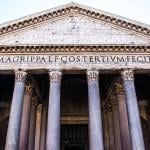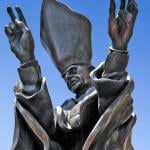
What does it mean to be moral, and what is the role of the conscience in being a “good” person? These are some of the questions that moral theology addresses.
In this paper, I will examine Catholic moral theology, the Catholic concept of the conscience, and the three pillars upon which morality rests.
Moral Theology
Moral theology is the branch of Catholic theology that focuses on the human response to divine revelation. More specifically, moral theology is concerned with human actions and behavior in light of God’s revelation and the Church’s teachings.
It is helpful to recognize two aspects of moral theology. The first is descriptive, drawing on what God has prescribed for human beings through scripture and tradition. The Ten Commandments and the Sermon on the Mount are examples of descriptive morality.
The second aspect of moral theology is applied, focusing on how to live a morally good life as a Catholic. In this sense, moral theology is concerned with the “acting out” of descriptive morality. Examples of this aspect include care for the poor and marginalized. (Matthew 25:34-40; corporal works of mercy).
Putting the two aspects of moral theology – the descriptive and the applied – together entails an internalization, a writing of the law on our hearts. This internal sense of morality is generally called the conscience.
Conscience
John Henry Newman famously referred to the conscience as “the aboriginal vicar of Christ in the soul” (Newman, John Henry. An Essay in Aid of a Grammar of Assent. 2018). Newman’s statement is intended to imply that the conscience is not the voice of the individual himself but rather the voice of God, who exercises sovereign authority, makes demands, and furnishes both reward and punishment.
A more general and perhaps philosophical definition would be that the conscience is a judgment of the intellect that draws from the general principles of faith and reason to determine the virtue or sinfulness of a particular action.
In a perfect world – one that is not subject to the damage of original sin – the voice of God in our souls would be crystal clear. Since this is not the case, the conscience must be formed correctly. Indeed, a properly formed conscience is part of the three legs of morality.
Succinctly put, “A well-formed conscience is upright and truthful. It formulates its judgments according to reason, in conformity with the true good willed by the wisdom of the Creator.” (Catechism of the Catholic Church, Paragraph 1783). There are various ways in which the conscience is well-formed. These include prayer, Scripture reading, and utilizing the teachings of the Church.
We are now better positioned to examine the foundational pillars of moral theology in more detail.
The Three Legs Of Morality
A fundamental precept of Catholic moral theology teaches that God is the ground of objective morality. This is a reasonably simple yet critical aspect of Catholic moral teaching and is the first pillar of morality.
We can observe that our world possesses numerous and varied goods. Moreover, these goods are hierarchical. Money is good, but inferior to what we use it for, to obtain, for example, food or shelter. It is manifest that whatever exists in a hierarchical form must have that which is considered the highest good. Catholicism asserts that the highest good is God. Perhaps more accurately (and platonically), God is goodness itself. (See Mark 10:18).
Contrasting this concept with its alternative position is helpful in bringing this concept into clear view. If God does not exist or is not the source of morality, then the responsibility falls to human beings. Morality becomes subjective and relative. In a sense, it is the eating of the tree of good and evil, arrogating for ourselves that which belongs to God alone.
Of course, subjective morality is not the position of the Catholic Church, nor does it align with our experience of reality. Principles of right and wrong are independent of human beings. However, it is necessary to make correct judgments about these moral principles. Such is the responsibility of the second leg of morality: the conscience.
Conscience must not be confused with feelings or even the will. Rather, as an operation of the intellect, conscience seeks to conform the mind to the objective principles that ground morality. These principles are presupposed as known to the mind, either from the light of natural reason reflecting on the data of creation or from divine faith which responds to God’s supernatural revelation.
Conscience is not the source of these moral principles. Instead, it uses objective moral principles as the premises from which to conclude whether something should be done because it is good or should not be done because it is bad. Its conclusions also apply to situations when the mind decides something is permissible or preferable but not obligatory. (See Hardon, John. Catholic Dictionary. 2013).
The final leg of morality is free will. A basic definition of free will is the capacity of a rational being to act or not to act, to do this or that, and so to perform deliberate actions on one’s own responsibility. (Catechism of the Catholic Church, Paragraph 1731).
Living things all seek that which they deem to be good. Free will can be defined as the power, free from coercion, to choose among several goods and the means to obtain them. Accordingly, free will allows humans to conform or not to the principles of objective morality.
As implied above, the study of morality (or moral theology) provides the framework by which human beings understand and make decisions about right and wrong. Unfortunately, due to the effects of original sin, the capacity of human beings to make moral decisions has been damaged. For this reason, the Catholic Church teaches that the conscience must be “well-formed” (Catechism of the Catholic Church, Paragraph 1783).
Conclusion
In many ways, morality sits at the center of the human experience and is critical to living in a society. From a Catholic perspective, to be moral is to align oneself with the mind of God.
In this essay, I have sought to touch upon the depth and significance of morality by articulating three pillars that make it possible.












